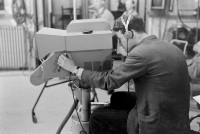SCREEN PLAYS
Electra
Classics on TV: BFI Southbank programme, 13 June 2012
Tonight sees the second programme in the five-night Screen Plays season Classics on TV: Greek Tragedy on the Small Screen at BFI Southbank. A few tickets are still available for the 6.15pm showing which features Electra (Associated-Rediffusion for ITV, 1962) and Women of Troy (BBC, 1958), followed by a panel discussion with actor and director Fiona Shaw and classical scholar Oliver Taplin of the University of Oxford. You can book via the BFI website. Following the first screening on 7 June we tried an experiment, inviting anyone who was at the screening to contribute their thoughts about the programme on this blog. That experiment was really successful, and so we will continue it for further screenings. Any and all responses would be welcome, however brief – and John Wyver and I will also be offering some further thoughts. Continue reading
Greek plays: Sophocles’ Electra (BBC, 1974)
Today I’d like to share some of my impressions of a viewing of Michael Lindsay-Hogg’s production of Sophocles’ Electra, televised on Wednesday 24 October 1974 as the BBC’s Play of the Month. Two years earlier, in November 1972, the BBC had broadcast another Sophoclean play―King Oedipus―in a production by Alan Bridges. Both Electra and King Oedipus used the Penguin translations by E. F. Watling, but in several other respects the productions could not have been more different. When Lindsay-Hogg was offered the chance to direct Electra in 1974, he says he was ‘intrigued […] because I thought that it was a yawn a minute, and I wanted to prove otherwise’. This post contrasts my own response to the production, at several decades’ remove, with contemporary critical accounts and the BBC’s Audience Research Report. Continue reading
Greek plays: Sophocles’ Electra (A-R for ITV, 1962)
At 9.45pm on Wednesday 28 November 1962 the ITV audience witnessed an extraordinary broadcast―a production of Sophocles’ Electra in Greek with no subtitles. But this was no antiquarian exercise in declaiming ancient Greek. Rather, this was a television version of Dimitris Rondiris’ internationally touring stage production with the Peiraïkon Theatron company and, using Ioannis Gryparis’ translation, it was being given in the living language of modern Greek. Here I draw on the extant recording at the BFI together with newspaper articles and reviews in working towards a critical interpretation of this production fifty years after its first broadcast. Continue reading
